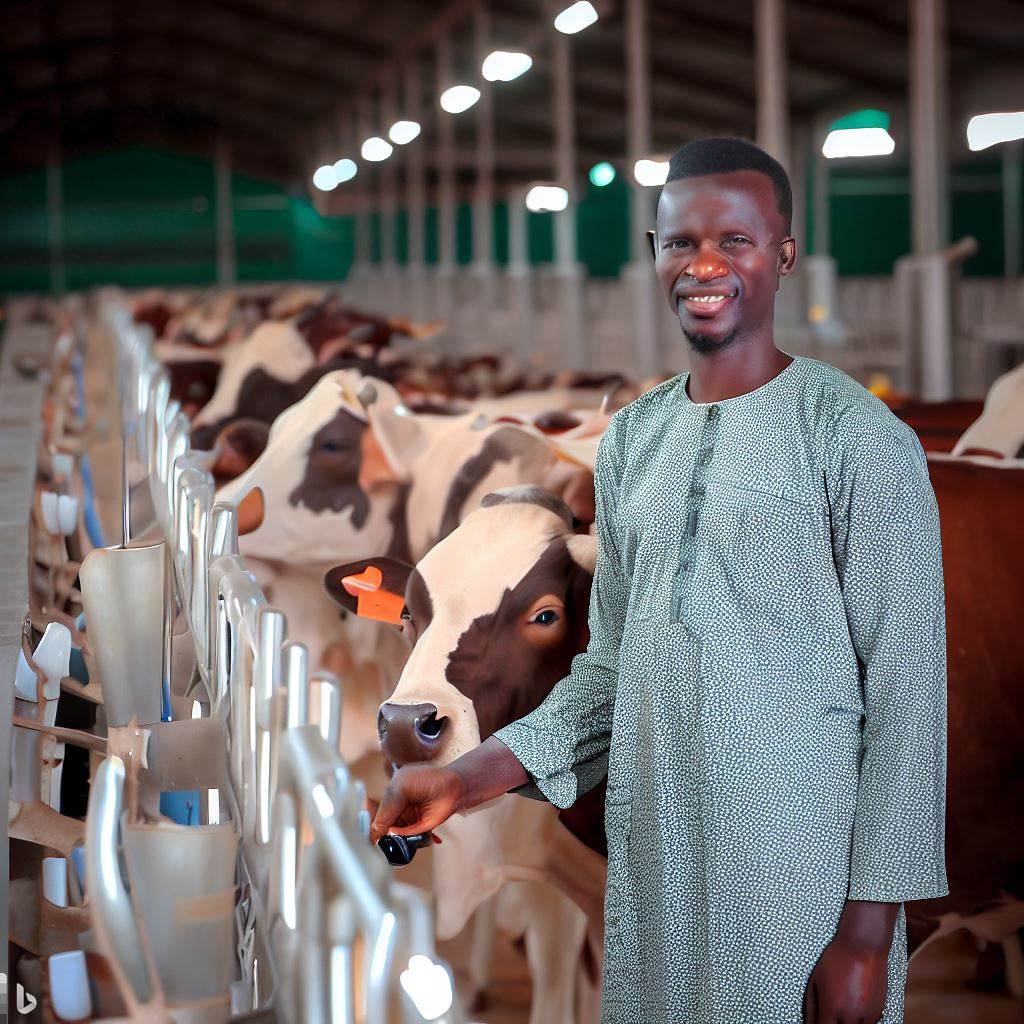Introduction
The dairy industry in Nigeria has experienced significant growth and challenges in recent years.
Cooperatives play a crucial role in agriculture by promoting collective action, pooling resources, and sharing risks and benefits.
This blog post aims to explore the potential of leveraging cooperatives for dairy production in Nigeria, highlighting their benefits and challenges.
Understanding Co-operatives
A. Definition and characteristics of cooperatives
A cooperative is a business organization owned and operated by a group of individuals for their mutual benefit.
Cooperatives are characterized by democratic control, voluntary membership, and shared decision-making. Members contribute to the capital of the cooperative and share in the profits and benefits.
Cooperatives play a vital role in transforming the dairy production sector in Nigeria.
By understanding the definition and characteristics of cooperatives, farmers can harness the power of collective action to overcome challenges and achieve their goals.
The democratic nature of cooperatives ensures that decisions are made with the best interests of the members in mind.
B. Cooperative principles and values
Cooperatives are guided by seven internationally recognized principles: voluntary and open membership, democratic member control, member economic participation, autonomy and independence, education, training and information, cooperation among cooperatives, and concern for the community.
Cooperatives uphold values such as self-help, self-responsibility, equality, equity, and solidarity.
The principles and values that guide cooperatives emphasize the importance of inclusivity, fairness, and cooperation.
By upholding these principles, cooperatives create an environment where all members have equal opportunities to contribute, benefit, and grow together.
The values of self-help and solidarity promote a sense of ownership and shared responsibility among members.
C. Benefits of forming and joining cooperatives in agriculture
Forming and joining cooperatives in agriculture brings numerous benefits. One of the key advantages is increased market power.
Through collective bargaining, cooperatives can negotiate better prices for their products and access larger markets that would be difficult for individual farmers to reach.
This leads to improved income and opportunities for farmers to expand their operations.
Cooperatives also provide improved access to resources. Small-scale farmers often struggle to invest in expensive machinery or infrastructure.
However, by pooling their resources, cooperatives can make such investments, improving productivity and efficiency in the sector.
Cooperatives can also facilitate technology transfer and provide training programs, allowing farmers to enhance their skills and adopt best practices.
Financial benefits are another advantage of cooperatives. By eliminating middlemen and directly linking farmers to markets, cooperatives ensure that members receive fair prices for their products.
Additionally, cooperatives can provide access to credit and financial services, enabling farmers to invest in their businesses and improve their productivity.
Collective decision-making ensures that the cooperative represents the interests of its members, and farmers have the opportunity to shape their industry and address common concerns.
Lastly, cooperatives contribute to social and community development. By promoting local economic growth, cooperatives create employment opportunities and support rural livelihoods.
In a nutshell, understanding cooperatives is essential for Nigerian dairy farmers looking to leverage their power for production.
Cooperatives provide a platform for farmers to join forces, benefit from collective action, and overcome individual limitations.
By embracing the principles and values of cooperatives, farmers can unlock the potential for growth, resilience, and sustainable development in the dairy sector.
Read: Nigeria’s Pioneering Dairy Producers: Success Stories
Challenges in Dairy Production in Nigeria
A. Lack of access to modern technology and equipment
- Limited availability of modern machinery and equipment for dairy production.
- Obsolete technology leads to low productivity and poor quality of dairy products.
- Lack of access to modern equipment hampers the efficiency and profitability of dairy farms.
- Inadequate technology results in wastage of resources and impedes growth in the dairy sector.
B. Insufficient knowledge and skills among farmers
- Many farmers lack the necessary knowledge and skills required for modern dairy production.
- Traditional farming practices are still prevalent, leading to low milk yields and substandard products.
- Lack of training programs and educational resources for farmers inhibits their capacity to improve dairy production.
- Insufficient knowledge about animal health and nutrition affects the overall productivity of dairy farms.
C. Limited access to credit and financial resources
- Farmers face challenges in accessing credit and financial support for expanding their dairy operations.
- High interest rates and collateral requirements make it difficult for farmers to obtain loans.
- Limited access to financial resources constrains investment in modern technology and infrastructure.
- Inadequate access to credit inhibits the expansion and development of dairy cooperatives.
D. Inadequate infrastructure for milk collection and processing
- Lack of proper collection centers and processing facilities hinders the efficient collection and processing of milk.
- Poor transportation networks result in delays and spoilage of milk during transportation.
- Inadequate cold storage facilities affect the quality and shelf life of dairy products.
- The absence of an organized milk collection system makes it challenging for dairy farmers to market their products effectively.
How to Address These Challenges
The challenges mentioned above highlight the major obstacles faced in dairy production in Nigeria. Addressing these challenges is crucial for the growth and development of the dairy sector in the country.
By leveraging cooperatives, some of these challenges can be overcome.
Cooperatives provide an opportunity for small-scale farmers to collectively invest in modern technology and equipment, solving the challenge of limited access.
Through cooperative efforts, farmers can pool their resources and purchase machinery and equipment that individually would be difficult to afford.
This cooperative approach enables them to improve productivity and the quality of dairy products. Furthermore, cooperatives can also facilitate knowledge sharing among farmers.
By conducting training programs and providing educational resources, cooperatives help farmers enhance their skills and knowledge in modern dairy farming techniques.
This empowerment enables farmers to adopt best practices and improve their dairy production outcomes. Another benefit of cooperatives is their potential to provide better access to credit and financial resources.
Pooling resources and collectively approaching financial institutions can help farmers secure loans at more favorable terms.
Cooperatives can negotiate lower interest rates, reduced collateral requirements, and provide guarantees, allowing farmers to expand their operations and invest in modern infrastructure.
Role of Cooperatives in Developing Milk Collection
In terms of infrastructure, cooperatives can play a significant role in developing robust milk collection and processing facilities.
By setting up collection centers, cooperatives ease the burden on individual farmers and ensure efficient and timely collection of milk.
They can also invest in cold storage facilities to maintain the freshness and quality of milk, reducing spoilage.
Finally, cooperatives can establish strong marketing networks to help farmers access wider markets for their dairy products.
In fact, dairy production in Nigeria faces significant challenges including limited access to modern technology and equipment, insufficient knowledge and skills among farmers, limited access to credit and financial resources, and inadequate infrastructure for milk collection and processing.
However, by leveraging cooperatives, these challenges can be effectively addressed.
Cooperatives provide a platform for collective investment, knowledge sharing, improved access to credit, and the development of essential infrastructure, propelling the growth and success of dairy production in Nigeria.
Read: Profitability Analysis of Dairy Production in Nigeria
Leveraging Cooperatives for Dairy Production
A. Strengthening collaboration among dairy farmers
Cooperatives enable dairy farmers in Nigeria to join forces and work towards a common goal. Through collaboration, farmers can share knowledge, experiences, and best practices to improve dairy production.
This collective effort leads to increased productivity, improved quality of dairy products, and higher profitability.
Farmers in cooperatives can also pool resources to invest in better infrastructure, equipment, and technology.
B. Sharing resources and reducing costs through cooperatives
In a cooperative, dairy farmers have the opportunity to share and benefit from shared resources. This includes access to machinery, storage facilities, transportation, and technical expertise.
By sharing these resources, farmers can significantly reduce their individual costs and increase efficiency.
They can also negotiate better deals with suppliers and gain access to affordable inputs such as feed and vaccines.
C. Enhancing bargaining power in the market
When dairy farmers form cooperatives, they can collectively negotiate better prices for their products.
Cooperatives aggregate the supply and create a stronger bargaining position in the market. This allows farmers to sell their dairy products at higher prices and earn better incomes.
Additionally, cooperatives can help in marketing and distribution, ensuring a wider reach for their products.
D. Accessing training and capacity building programs
Cooperatives provide dairy farmers with access to training and capacity building programs. These programs aim to improve the technical skills and knowledge of farmers.
Training can cover various aspects of dairy production, including animal health, breeding, nutrition, and milk processing.
This helps farmers enhance their productivity, adopt modern practices, and comply with quality standards.
Through cooperatives, farmers can also access financial and business management training to improve their overall management skills.
By leveraging cooperatives for dairy production in Nigeria, farmers can unlock numerous benefits.
Through collaboration, they can strengthen their position in the market, share resources, reduce costs, and access training.
These cooperative efforts lead to enhanced productivity, improved quality, and higher profitability for dairy farmers in Nigeria.
Read: The Future of Dairy and Livestock Production in Nigeria

Successful Case Studies of Cooperative Dairy Production in Other Countries
Overview of successful cooperatives in countries with similar dairy industry challenges
In countries like India, the Gujarat Cooperative Milk Marketing Federation (GCMMF) has been a successful example of dairy cooperatives.
Key strategies adopted by successful cooperatives
One of the key strategies followed by successful cooperatives is collective decision-making, where all members have a say in the processes.
Additionally, ensuring transparency in financial transactions and governance is vital for success.
Successful cooperatives also prioritize quality control measures to maintain the reputation of their dairy products.
Lessons that can be applied to the Nigerian context
The Nigerian dairy industry can learn from successful cooperatives by focusing on strong leadership and cooperative management.
- Emphasizing proper training and capacity building programs for farmers can improve the overall productivity and efficiency of dairy cooperatives in Nigeria.
- Strengthening financial systems and access to credit can empower dairy cooperatives to invest in modern technologies and equipment.
- Establishing strong market linkages and partnerships with other stakeholders in the dairy value chain can enhance the marketing and distribution of dairy products.
- Building trust among members and promoting a sense of ownership and belonging can foster teamwork and cooperation within Nigerian dairy cooperatives.
- Creating platforms for knowledge sharing and exchange of best practices among dairy cooperatives can promote innovation and continuous improvement.
- Recognizing the importance of research and development can help Nigerian cooperatives stay updated with the latest advancements in dairy production techniques.
- Promoting gender inclusivity and the active participation of women can contribute to the success and sustainability of dairy cooperatives in Nigeria.
- Engaging in advocacy and policy dialogues to address regulatory challenges and create a favorable business environment for dairy cooperatives is essential.
Read: The Future of Animal Genetics in Nigeria
Steps to Forming and Operating a Dairy Cooperative in Nigeria
Identifying potential stakeholders and members
- Conduct market research to identify potential dairy farmers interested in forming a cooperative.
- Engage with local communities, farmers’ associations, and agricultural organizations to recruit members.
- Assess the skills, resources, and commitment of potential stakeholders to ensure their suitability for cooperative membership.
- Facilitate meetings and workshops to educate and create awareness about the benefits of cooperative dairy production.
Establishing cooperative bylaws, roles, and responsibilities
- Collaborate with members to draft cooperative bylaws that outline the purpose, structure, and decision-making processes.
- Define the roles and responsibilities of each member, including leadership positions and committee assignments.
- Establish procedures for membership admission, expulsion, and dispute resolution to ensure fair governance.
- Conduct regular meetings to address members’ concerns, review progress, and make collective decisions.
Developing a business plan and securing funding
- Assess the market demand for dairy products and determine the cooperative’s production and marketing strategies.
- Develop a comprehensive business plan that includes financial projections, marketing initiatives, and growth strategies.
- Identify potential sources of funding, such as government grants, agricultural loans, or partnerships with investors.
- Prepare and submit funding proposals, highlighting the cooperative’s potential impact on the local economy and dairy sector.
Implementing efficient milk collection, processing, and marketing systems
- Establish a reliable milk collection system by strategically locating collection centers and setting schedules for farmers.
- Invest in modern milk processing equipment to ensure quality, safety, and efficiency in dairy product manufacturing.
- Implement effective storage and transportation practices to maintain product freshness and reduce spoilage.
- Develop marketing strategies to promote cooperative dairy products, including branding, distribution networks, and partnerships with retailers.
By following these steps, aspiring dairy farmers in Nigeria can leverage the power of cooperatives to enhance their production, market reach, and overall profitability.
Government Support and Policy Recommendations
A. Importance of government support for cooperative development
Government support plays a crucial role in the successful development of cooperatives. It provides the necessary resources, infrastructure, and policies to foster their growth.
Cooperatives contribute to the economy by generating income, creating jobs, and reducing poverty. Therefore, government support is essential to harness their potential and maximize their impact.
B. Existing government initiatives and policies in Nigeria
The Nigerian government has recognized the importance of cooperatives in the agricultural sector.
Initiatives like the National Cooperative Development Program (NCDP) have been established to promote cooperative activities.
The government has also implemented policies to provide financial assistance and training programs for cooperative societies.
Furthermore, the Agricultural Cooperative Societies Act (ACSA) provides a legal framework for the formation and operation of cooperatives.
C. Recommendations for improving government support
- Enhance financial support: The government should allocate more funds to support cooperative development and provide accessible loans.
- Strengthen infrastructure: Improving rural infrastructure, such as roads and storage facilities, will benefit cooperative production and distribution.
- Promote cooperative education and training: Implement programs that educate members on cooperative principles, management, and best practices.
- Simplify bureaucratic processes: Simplifying registration, licensing, and compliance procedures will facilitate the establishment and operation of cooperatives.
- Ensure policy consistency: Policies should be formulated and implemented consistently to provide a stable environment for cooperatives.
- Encourage cooperation among government agencies: Different government agencies should collaborate to provide comprehensive support to cooperatives.
- Foster market linkages: Facilitate partnerships between cooperatives and market actors to enhance market access and improve income for members.
- Support research and innovation: Invest in research and development to improve productivity, quality, and value addition in cooperative dairy production.
- Address security challenges: Enhance security measures to protect cooperative investments, livestock, and equipment from theft and vandalism.
- Engage stakeholders: Foster dialogue and collaboration between government, cooperatives, NGOs, and other stakeholders to ensure inclusive decision-making and support.
By implementing these recommendations, the Nigerian government can create an enabling environment for cooperative dairy production.
Government support will empower cooperatives, enhance their contribution to the dairy sector, and ultimately promote economic growth and rural development.
Conclusion
Leveraging cooperatives for dairy production in Nigeria is crucial for various reasons. Cooperatives provide small-scale farmers with access to resources, information, and markets that they may not have individually.
By pooling their resources and knowledge, farmers can improve efficiency, reduce costs, and increase their bargaining power.
Furthermore, cooperatives allow farmers to benefit from economies of scale and share risks.
In the dairy industry, where there are significant challenges such as limited access to high-quality feeds and poor infrastructure, cooperatives can play a vital role in supporting farmers.
They can facilitate training programs, provide access to credit, and negotiate better prices for inputs and products.
Encouraging farmers to collaborate and consider forming or joining cooperatives is essential for the sustainable development of the dairy sector in Nigeria.
Through cooperatives, farmers can enhance their competitiveness and profitability while contributing to the overall growth of the industry.
By working together, farmers can overcome common obstacles and collectively address issues such as milk quality, disease control, and adoption of modern technologies.
Cooperatives have the potential to transform the Nigerian dairy industry. They can create a supportive network for farmers, promote knowledge sharing, and foster innovation in dairy production.
The government and relevant stakeholders should recognize the importance of cooperatives and provide the necessary support and enabling environment for their establishment and operation.
By leveraging cooperatives effectively, Nigeria can achieve self-sufficiency in dairy production, improve food security, and create livelihood opportunities for rural communities.




